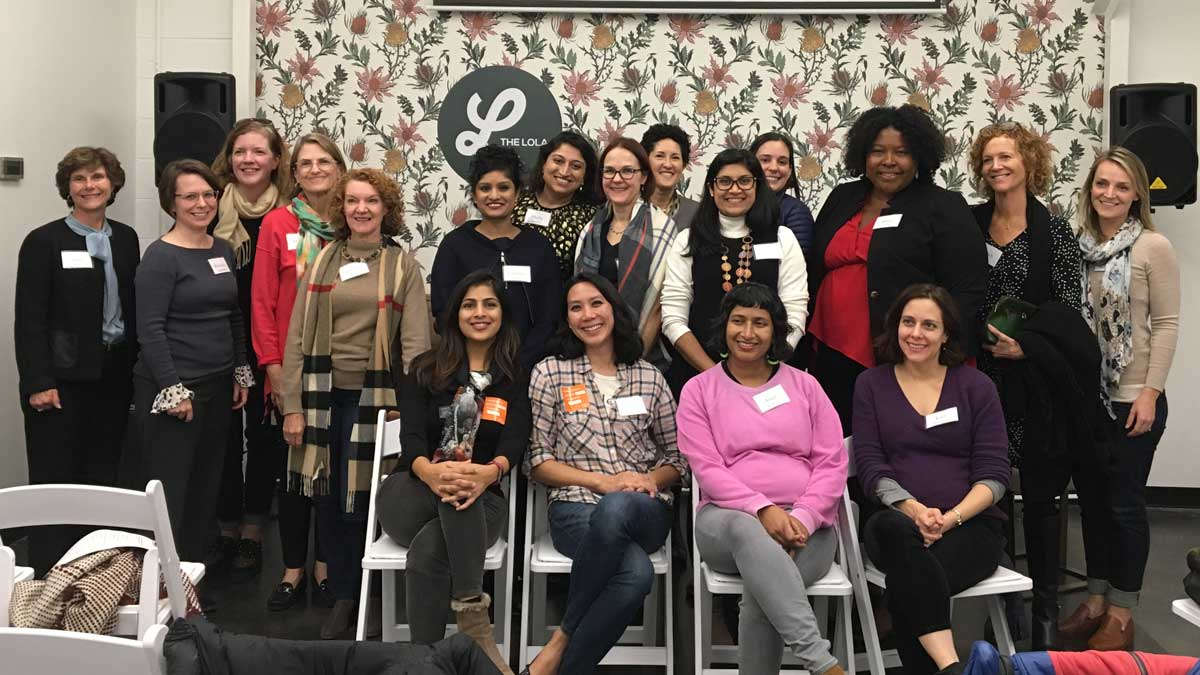 WCW is pleased to announce that it is partnering with the Women’s Foundation of Boston to conduct an in-depth analysis of the state of women and girls across Massachusetts, with a particular emphasis on their economic empowerment.
WCW is pleased to announce that it is partnering with the Women’s Foundation of Boston to conduct an in-depth analysis of the state of women and girls across Massachusetts, with a particular emphasis on their economic empowerment.

 In a commentary, Sari Pekkala Kerr, Ph.D., discusses how the pay gap changes for parents throughout their careers.
In a commentary, Sari Pekkala Kerr, Ph.D., discusses how the pay gap changes for parents throughout their careers.
 The share of immigrant entrepreneurs in the U.S. has increased, which means they will play a major role in the economic recovery from COVID-19, according to Sari Pekkala Kerr, Ph.D.
The share of immigrant entrepreneurs in the U.S. has increased, which means they will play a major role in the economic recovery from COVID-19, according to Sari Pekkala Kerr, Ph.D.
 Sari Pekkala Kerr shared findings from her research during a hearing on the economic benefits of immigration (June 2019).Sari Pekkala Kerr, Ph.D., discussed her findings on the positive contributions that immigrant entrepreneurs make to the American economy.
Sari Pekkala Kerr shared findings from her research during a hearing on the economic benefits of immigration (June 2019).Sari Pekkala Kerr, Ph.D., discussed her findings on the positive contributions that immigrant entrepreneurs make to the American economy.
 November 26, 2019
November 26, 2019
The Wellesley Centers for Women, Wellesley Club of Atlanta, and The Lola, a women-focused coworking space, joined together in Atlanta, GA, in November 2019 to discuss women's entrepreneurship, the gender pay gap, and work-life balance.
 June 26, 2019
June 26, 2019
Sari Pekkala Kerr, Ph.D., economist and senior research scientist, testified before the U.S. House Committee on the Budget at a hearing on the economic benefits of immigration.
 A new study from economist Sari Pekkala Kerr, Ph.D., highlights differences in networking habits of immigrant and non-immigrant entrepreneurs.
A new study from economist Sari Pekkala Kerr, Ph.D., highlights differences in networking habits of immigrant and non-immigrant entrepreneurs.
In co-working spaces, immigrants take more advantage of networking opportunities than U.S. born entrepreneurs, especially around the exchange of advice, according to WCW's Dr. Sari Kerr.
Immigrant Entrepreneurship in America: Key Lessons from Recent Research
Immigration plays an important role in the growth of the U.S. population and economy, yet we continue to debate whether it has positive or negative impacts on native U.S. workers, and how these impacts are divided among population groups. In the last few years, it seems that the tone of this debate has become increasingly bitter and the views more divided.
Dr. Sari Kerr shares eight important facts from her research on immigrant entrepreneurs.
Dr. Sari Pekkala Kerr discusses motherhood and the gender wage gap.
The work of Dr. Sari Pekkala Kerr in understanding how immigrants have become a key driver of innovation and entrepreneurship in the U.S. is highlighted.

Economist Sari Kerr, Ph.D., co-authored papers immigrant entrepreneurs, start ups, networking, and collaborative patents to better understand today’s workforce.
Dr. Sari Pekkala Kerr's research shows that the motherhood wage penalty is real.
Sari Pekkela Kerr, Ph.D, senior research scientist/economist, Wellesley Centers for Women
U.S. Is Lagging Behind in Skilled Immigration Policy Research demonstrates highly positive impacts of skilled immigration resulting in countries competing globally for talent. Although many countries are continuously introducing new policies to attract more skilled workers, the U.S. immigration policy is in a gridlock with little progress.
Sari Pekkela Kerr, Ph.D, senior research scientist/economist, Wellesley Centers for Women
U.S. Does Not Have Paid (Federal) Family Leave
Although research shows clear benefits of family leave, the U.S. remains the only developed country that does not offer paid family leave for its workers. This hampers women’s work efforts and endangers the wellbeing of children.
Sari Pekkala Kerr of WCW is featured in Business Mirror and discusses immigrants and entrepreneurship.
Sari Pekkala Kerr of WCW is featured in this article about immigrants and entrepreneurship in Harvard Business Review.
Sari Pekkala Kerr of WCW is featured in Vox and writes about immigrant entrepreneurship and employment growth in the U.S.
Research & Action Report, Fall/Winter 2015
Sari Pekkala Kerr, Ph.D., senior research scientist/economist at the Wellesley Centers for Women (WCW), spent four weeks visiting the Research Institute of the Finnish Economy (ETLA) in Helsinki where she used grant money from the Yrjo Jahnsson Foundation to continue her research on the project, “Within and Between Firm Trends in Job Polarization: Role of Globalization and Technology.”
Research & Action Report, Spring/Summer 2015
Sari Pekkala Kerr, Ph.D., arrived at the Wellesley Centers for Women (WCW) in 2010 as a deeply experienced senior researcher/micro economist. Her expertise and research accomplishments have significantly broadened the Centers’ reach into the economic implications of various government policies and marketplace realities, often with a particular focus on gender. As a micro economist, she typically studies the effects of such policies and realities on the lives of individuals, families, and children. She also brings to her work in the U.S. significant contributions from her continuing research of related issues in Europe, especially her native Finland. As a social democracy, that nation maintains a vast body of demographic statistics that has enabled her to study and quantify effects of various policies on millions of specific individuals. In some of her current work in the U.S., she seeks as far as possible to achieve an analogous breadth of scope.
Research & Action Report Fall/Winter 2013
Sari Pekkala Kerr, Ph.D., senior research scientist and economist at WCW visited the Research Institute of the Finnish Economy (ETLA) in Helsinki in September 2013. While there, she worked on the “Job Polarization and Wage Inequality” project, where the research team evaluated how job polarization in Finland has taken place within and across firms, and how this relates to the firms’ outsourcing and export decisions, as well as changes in their research and development investments and information and communications technology usage. Job polarization—or erosion of mid-level jobs—is occurring in practically all industrialized countries, and is causing a widening of income disparities. The Finnish data uniquely allow the researchers to conduct a deep analysis of the phenomenon at the firm level and understand the mechanisms driving job polarization. The project is funded by the Academy of Finland. While working in Finland, Kerr presented “Immigration and Employer Transitions for STEM Workers,” with William Kerr, Ph.D. at the Jyväskylä University School of Business and Economics Seminar.
Research & Action Report, Spring/Summer 2014
Sari Pekkala Kerr, Ph.D., senior research scientist and economist at the Wellesley Centers for Women (WCW) will be in Finland for five weeks this summer to work on the project, "Within and Between Firm Trends in Job Polarization: Role of Globalization and Technology," with Mika Maliranta, Ph.D. and Terhi Maczulskij, Ph.D., from the University of Jyvaskyla. The researchers will use Finnish Employer-Employee panel data that can only be accessed locally. This project is funded by the Academy of Finland.
For Immediate Release: January 22, 2014
Forbes, January 22, 2014
Dina Gerdeman
The New York Times, June 27, 2013
Somini Sengupta
 The Atlantic Cities October 4, 2012
The Atlantic Cities October 4, 2012by Sari Kerr, Ph.D.
The Wall Street Journal
May 6, 2012
Ms. Hymowitz concludes that no family policies exist that have created gender equality at the workplace. As evidence, she cites gender income gap figures from Sweden and Iceland. The article, however, confuses multiple related issues in its arguments: labor force participation, part-time work, occupational segregation and gender wage gap.
Research & Action Report, Spring/Summer 2011
Sari Pekala Kerr, Ph.D., who arrived at the Wellesley Centers for Women (WCW) in 2010, brings not only experience in economic research and consulting in the U.S. to her work at WCW, but also expertise in analyzing economic effects of government policies in her homeland of Finland. That expertise became possible because of Finland’s remarkable record of demographic statistics, which reflect—in a breadth of detail that can amaze many—the experience of three generations of Finns. The Centers expect many of Kerr’s contributions to benefit from that research. Her newest project—supported by the Centers’ 35th Anniversary Fund—will study how maternity leave policies in both Finland and the United States affect women’s subsequent employment.
 Sari Kerr, Ph.D., worked with Nobel Prize winner Claudia Goldin, Ph.D., on some of her groundbreaking research on the gender pay gap.
Sari Kerr, Ph.D., worked with Nobel Prize winner Claudia Goldin, Ph.D., on some of her groundbreaking research on the gender pay gap.